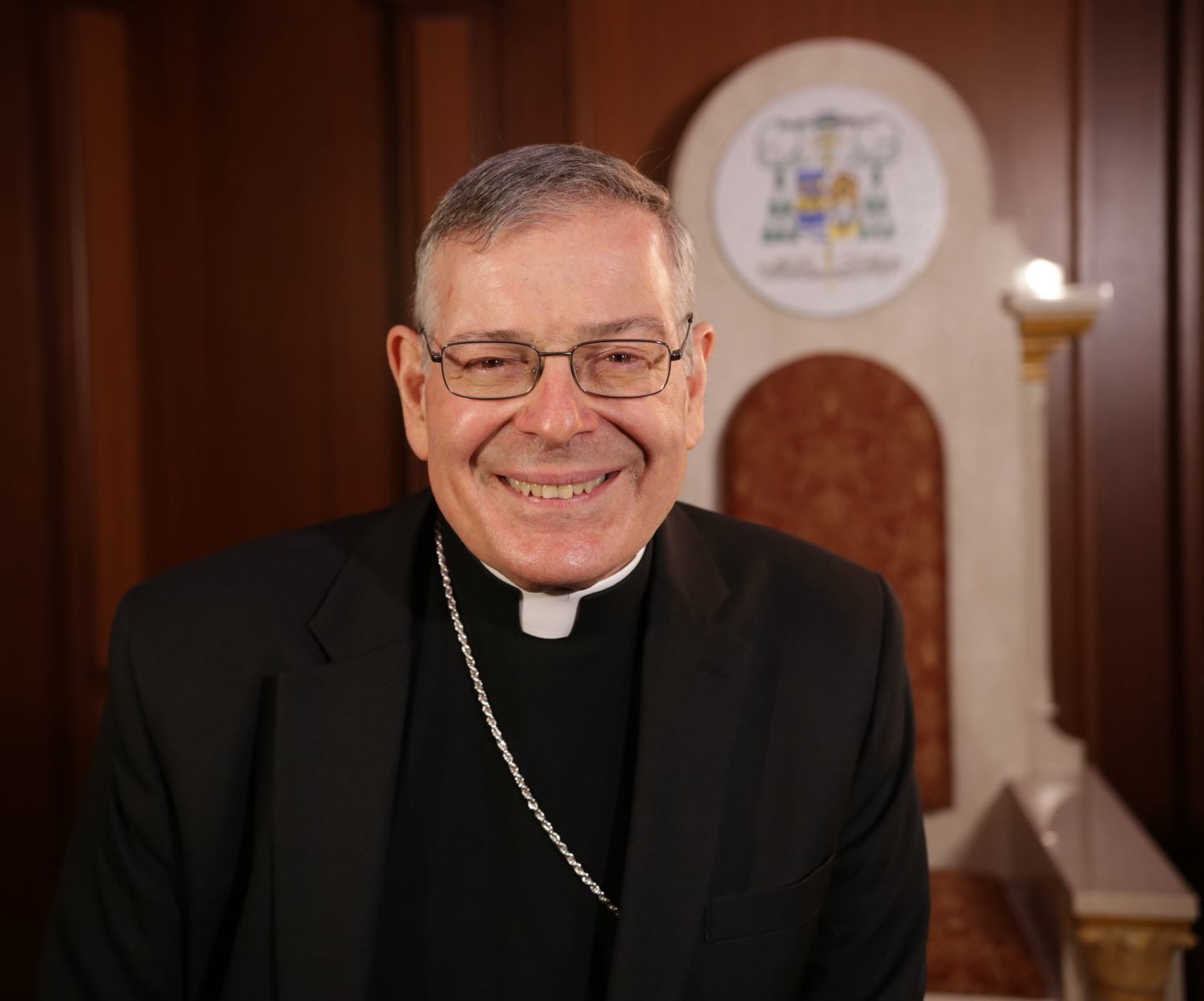
Homily - Priesthood Ordination of
Deacon Marc Gustinelli
My brother, Deacon Marc, before you are ordained to the priesthood today, you will make a promise of commitment to the priestly life which you will embrace. I will ask you six questions to which you reply in the affirmative indicating your willingness to be uniquely configured to the Person of Jesus Christ which the Sacrament of Holy Orders will effect in you. All of the promises center around your willingness to exercise the ministry of Christ in union with the presbyterate you will become a part of today and to unite yourself most fully to Christ in order to serve the people who will be entrusted to your care. One of the promises emphasizes what is essential to your ministry and to your personal life as a priest. That essential is prayer. The question that will be asked of you is, “Do you resolve to implore with us God’s mercy upon the people entrusted to your care by observing the command to pray without ceasing?” You commit yourself to a lifelong and challenging ideal, “to pray without ceasing!”
The phrase to “pray without ceasing” is from Saint Paul’s First Letter to the Thessalonians (5:17). It is part of his trilogy of admonitions: “Rejoice always. Pray without ceasing. In all circumstances give thanks” (5:16–18). To pray without ceasing, to rejoice always and to give thanks in all things are essential characteristics of a priest’s life and depend on each other. To pray without ceasing is mirrored in Saint Paul’s First Letter to the Ephesians, “Pray at all times in the spirit,” (6:18) and in his First Letter to Timothy, “Pray with uplifted hands in all places” (2:8).
It is the command to pray without ceasing which is what motivates the wanderer in the spiritual classic, The Way of a Pilgrim, who undertakes a lifelong journey through Russia in his search for God. The pilgrim questions what Saint Paul means by praying without ceasing and how this can come about in his life. From his search, he discerns what is referred to as the prayer of the heart, “Lord Jesus Christ, Son of God, have mercy on me a sinner!” From this foundational prayer, he begins to see the presence of the Lord in all of the events and people he encounters in his travels.
On several occasions, Pope Francis has referred to the book, The Way of the Pilgrim, and has recommended a reading of it. The Pope emphasizes how ceaseless prayer does not separate us from everyday affairs but helps us to enter into them and to see the presence of God in them. This is extremely important in the life of a priest who, like the pilgrim, encounters so many people and incidents in his ministry from the infirm and suffering to the annoying need to attend to parish building repairs! It is only through his prayer, in all matters, that the priest can see Jesus Christ. He has to turn to Him in everything and to turn everything into a prayer.
In his catechesis on prayer during his general audiences of 2021, Pope Francis emphasized that prayer was the most characteristic element of Jesus’ life and ministry. The Lord did not become one of us to engage in social action, to change the politics of the world or to engage in management and better business practices, as important as those matters are. He left those to others. As the Pope expressed, “Jesus prayed a lot. In the course of his mission, Jesus immersed Himself in it because dialogue with the Father was the incandescent core of His entire existence.” Pope Francis reflected how Jesus’ prayer became even more intense and intimate at the time of His Passion and death. He reflected, “In the days of His last Passover, we thus find Jesus fully immersed in prayer.”
My brother, Marc, as we reflect upon the readings you have chosen for your Mass of ordination today, we hear clearly of the immersion of Jesus in prayer especially at the moment of His Passion. The Letter to the Hebrews affirms, “In the days when He was in the flesh, He offered prayers and supplication with loud cries and tears to the one who was able to save Him from death and He was heard because of His reference. Son though He was, He learned obedience from what He suffered and when he was made perfect, He became the source of eternal salvation for all who obey Him, declared by God as high priest according to the order of Melchizedek” (5:7-10).
The Gospel passage from Saint John proclaimed today, is the from the account of Jesus appearing to His disciples on the night of Easter. As He appears to them, he shows them the marks of His wounds from the Cross. His suffering, no longer with Him, bears a permanent sign in His risen body as integral to His mission and His risen life. He then sends the apostles out giving them the gift of the Holy Spirit and the authority to forgive sins. However, that mission and that authority are tied to His suffering as handed to His apostles. The same mission is given to you today, Marc, in an intimate manner. It joins you to the Lord and will be joyfully sustained by your observing the command “to pray without ceasing.”
The central prayer of the priest is that of the Eucharist. It must be the ceaseless prayer of the priest which is at the core of all of his union with the Lord. Marc, as you are configured to Christ today, your unique configuration will allow you to stand in His Person and to do what He did at the Last Supper. The more His words, “This is my Body given up for you, this is the Chalice of my Blood shed for you,” become your own words, the more you will find you are in union with the Lord. The more you also find your own personal identity as a priest. In laying down your life for Christ, you will find the true meaning of your priesthood as well as the full joy which the Lord promises. Your unique configurations to Christ will also allow you to forgive sins in His name in the Sacrament of Penance, as the Lord directed the apostles in the Gospel today. Never forget that you will most effectively do this, the more you prayerfully are aware of your own need for that Sacrament.
St. John Bosco, a great model of praying always, celebrated a number of Masses during the first week after his ordination to the priesthood, in places that were meaningful to him. After that week, when he was at home with his mother, he recounts, “When we were alone that day, my mother said to me these memorable words: ‘You are now a priest, and you celebrate Mass. You are, therefore, closer to Jesus Christ. But remember that to begin to say Mass is to begin to suffer. You will not become aware of this immediately, but little by little you will realize that your mother was right.” What insightful words from Don Bosco’s mother reminding her son of the unique union that he had now with the Lord in the Eucharist and how in it he would participate in a particular manner in the Lord’s Passion which leads to life. Don Bosco’s mother’s words to her son reflect those of the Lord today in the first reading from the Book of Jeremiah, “Do not say, ‘I am too young.’ To whomever I send you, you shall go; whatever I command you, you shall speak. Do not be afraid of them, for I am with you to deliver you” (1:7-8).
In a homily to some newly ordained priests some years ago, Saint Pope John Paul II expressed to them, “Your priestly origin is Trinitarian. You are born from the depths of this unspeakable divine mystery: from the love of the Father, the grace of Jesus Christ, from the gift of the Holy Spirit.” The life of the Trinity, for all eternity, is a life of prayer between the three Persons. That prayer became so evident in the human life of Christ and that is why it is particularly significant for a priest to pray without ceasing. He enters into the life of the Trinity, especially in the Eucharist, where he encounters the passionate love of God.
My brother, Deacon Marc, I, the Bishop, with all of my brother priests, welcome you into the life of the presbyterate of the Diocese of Palm Beach. As you are uniquely configured to Christ through ordination today and continue to grow each day in your priesthood and as people continue to mold you in the priesthood, always experience the joy that the Lord wants you to possess. You will know that joy not by separating yourself from the people in the everyday matters of life but by entering more deeply into them in union with Christ in learning to pray without ceasing, the foundation of your priestly life. May the Lord who begins this work in you today continue to bring it to fulfillment!
Most Reverend Gerald M. Barbarito
May 12, 2023

